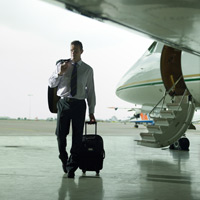With the economy booming in post-Soviet Russia, an increasing number of British businessmen are finding it necessary to visit the country.
But the routine frustrations and stress of flying with scheduled airlines, plus added security complications in the wake of the August airport terrorist scare, have turned the thoughts of many to the possibility of chartering.
Yes, it costs considerably more – but the advantages are numerous.
What price the advantage of flying to your schedule, not somebody else’s? Chartering a private aircraft means you can control your itinerary, minimise airport delays and check-in times and simplify complex travel planning. One call and it’s organised. And throughout your journey you can focus completely on the business ahead.
In Britain, there are many private charter flight operators offering highly competitive rates for round trips to Russia. Cost of a British Airways Club Class return flight from London Heathrow to Moscow’s Domodedovo airport is about £1,795.
Flying with an air charter operator from Farnborough, Hampshire, to Domodedovo in a Lear jet 60 twin jet six-seater costs £19,000 and takes three hours and 25 minutes, with a 20-minute check in.
So to a company sending three executives, the price per head works out at £6,333.
Flights from London’s City airport reflect a similar price structure. A nine-seat turbo prop, which takes five hours and five minutes, costs £15,847.
A nine-seat light jet, taking three hours and 45 minutes, costs £20,635, and the price of a 14-seater heavy jet comes in at £63,255. So if you took a corporate party on this flight, it would work out at a fairly respectable £4,518 per head. To all these prices, though, you have to add VAT and taxes.
One British charter company with a Moscow subsidiary has reported a sharp rise in the demand for private charters since the August terror alert, with bookings almost double normal levels for that month.
Meanwhile, in Russia the business aviation market has become one of the fastest-growing in the world.
It all began during Russia’s privatisation years of the 1990s, when the notion of personalised, flexible transport caught the imagination of a new breed of entrepreneur. At the forefront of this development were the oligarchs who became millionaires through acquiring vast interests in the media and energy sectors.
In addition, steady economic growth – with Russia averaging a 6.4 percent annual rise over the last seven years – has swelled the ranks of high net-worth individuals turning to business aviation to meet their transport needs.
A recent study by market research group Ros Business Consulting, who have offices in London and St Petersburg, revealed that business aviation traffic in Russia has grown by up to 50 percent in the last three years, with turnover climbing from $750m in 2004 to $1bn in 2005.
With more than half of Russia’s billionaires and millionaires living in the Moscow area, it is no surprise that the Russian capital has become the hub of the nation’s business aviation activity. Moscow’s three airports, Domodedovo, Sheremetyevo and Vnukovo, handle more than 120 business flights a day, and these continue to grow by 30 percent a year.
With its favoured location, Vnukovo, 17 miles to the southwest of the capital and the only airport within the Moscow boundary, is now regarded as the hub of business traffic. Domodedovo is 28 miles to the southeast and Sheremetyevo is 18 miles to the northwest.
Western operators have not been slow to spot the potential of the Moscow connection. Major players now include Jet Aviation, London Executive Aviation and TAG Aviation – and all three have reported increasing demand for charter services to and from Russia.





